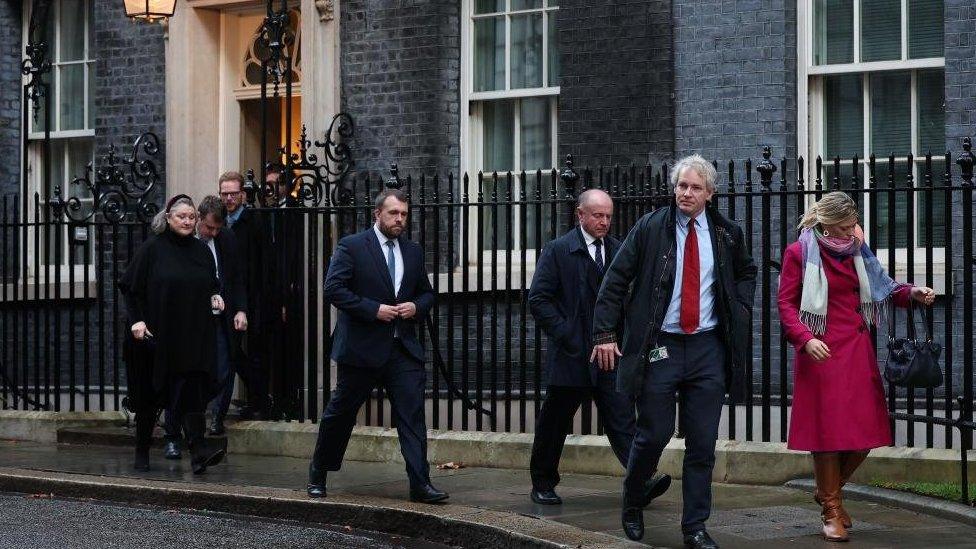'Addicted to division': Rishi Sunak beset by warring Tory factions
- Published
- comments
Watch: Moment Sunak wins Rwanda vote
Rishi Sunak had a good day on Tuesday - a rare experience for the prime minister recently.
At dawn, it was not totally out of the question that the day would end with Mr Sunak's immigration policy, his authority, even his leadership in serious peril.
By the end of it, his flagship Rwanda asylum scheme had progressed to the next legislative stage without a single Conservative MP voting against it.
So yes, a good day. But Mr Sunak has been prime minister long enough now to know that in his line of work every silver lining has a cloud.
Let's start with the good news. Most obviously: the government won the vote. Mr Sunak did not become the first prime minister in almost 40 years to lose a vote at the second reading stage.
The prime minister staked his personal authority on winning potential rebels round - allowing them to process up Downing Street before the cameras, to sit around the cabinet table eating bacon rolls and venting their frustration about not only Rwanda but the quality of the Conservative whipping operation and the government's "socialism".
A day on and the government's whipping operation looks fairly robust whereas some of the rebels' private predictions about their own numbers look a little excitable. There were meant to be so many rebels that they could be split into 'five families', a label that even one paterfamilias privately lamented "makes us look ridiculous".
But of a purported 40 MPs preparing to abstain or vote against the government, only just shy of 30 abstained. Some of those who felt strongly enough to attend the Downing Street breakfast ended up voting for the bill, external.
This matters because the numerical strength of the Tory right is crucial to anticipating what will happen when the bill returns to the Commons in the new year. Mr Sunak quelled the rebellion but at a price: he told the rebels he was open to "tightening" the bill.
What exactly does that mean? It's not clear. Different MPs have different views. Some on the right believe it means the government is prepared to discuss wide-ranging amendments to the legislation. Others believe their colleagues are "deluded" and that Mr Sunak will only entertain minor linguistical tweaks.

The Tory MPs who met Mr Sunak on Tuesday morning could pose him a problem as the bill progresses
But even if the rebels end up disappointed and therefore decide to try to vote down the bill at a later stage, it would require more than the MPs who abstained to turn on the government - several of those who backed the government last night would have to switch sides too.
Of course, the Conservative right may end up getting what they believe they were promised. In that case, Mr Sunak could find himself with a problem from the One Nation group on the other flank of his party.
Announcing their support for the legislation in its current form on Monday, the group made clear that if it moves to the right they are likely to turn into rebels.
Not that everyone believes them. This group is less habitually rebellious than the right. "Every One Nation rebellion ends a few minutes before the vote with someone like Robert Buckland asking a minister to give an assurance from the despatch box and accepting it," one MP said.
But set aside the arithmetical questions for a second and the problems faced by Mr Sunak become clearer.
This was meant to be emergency legislation, designed to finally get the Rwanda policy up and running. Initially, the government hoped it would clear all the Commons stages by Christmas.
Yesterday's vote became far more difficult than most had expected - and as a result the bill is going to take longer than expected. The sound and fury of this week will inevitably be replicated at later stages, whatever the eventual outcome.
And Mr Sunak can ill-afford for his party to look so divided on such a central issue in an election year. "Focus groups are furious with the government about this," one source said. "It doesn't necessarily move the polls but it does bake in existing anger."
Importantly, it's not just the legal questions of the Rwanda policy that the Conservative Party is divided on. Many of Mr Sunak's supporters see this week's row as the symptom of a broader split rather than the original cause.
"There is a group of MPs who just won't let us govern," one minister said. "They ask for tax cuts, they get them. They ask for more engagement from the PM, they get it. But they're just addicted to division and can't help themselves."
For MPs on the right of the party, this gets it the wrong way round: they argue they are trying to jolt Mr Sunak into delivering the policies they believe they were elected to pursue.
How far will they want to push things in the new year is unclear. Some believe that a significant number of potential rebels ultimately stepped away from the edge on Tuesday because the political consequences of the government losing were so unclear, some even suggesting it would provoke a leadership election or a general election.
There are plenty in government who believe this will act as an ultimate constraint on MPs right up until the election, whenever it comes.
Others are less sure. "Our appetite for regicide is insatiable," one former minister said.
A cabinet minister, meanwhile, predicted the government would be "fighting day to day" with backbenchers up until the election.
Asked if Mr Sunak could really battle on like that until as late as October or December next year without going to the polls earlier, the cabinet minister replied: "No chance."